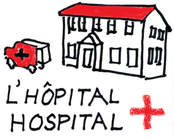Refugees: Myths and Facts #7
|

Myth #7 Refugees are receiving better health care than Canadians
The Facts: Refugees are not receiving some kind of special ‘gold-plated’ health care. Under the Interim Federal Health Program (IFHP) – first established in 1957 – refugee claimants and resettled refugees are entitled to health care similar to that given to welfare recipients, but it is paid for by the federal rather than provincial government.[i] IFHP coverage of medical and hospital services is identical to that provided by provincial health insurance plans (e.g., RAMQ). In addition, the IFHP provides coverage of medications as well as limited coverage of certain other services (e.g. eyeglasses). This coverage is comparable to that of many low-income Canadians.
In practice, however, refugee claimants have considerable difficulty accessing health services. Many doctors, pharmacists and other health care providers refuse to provide care or demand payment for services that are supposed to be covered through the IFHP. This is largely due to confusion about the IFHP and the fact that relatively few health care providers choose to register under the IFHP system.[ii] This means that many refugees who are suffering from serious physical and psychological conditions may not get the help they need. In addition, refugee health care costs are far lower than the average cost for Canadians, largely because refugee claimants are generally fairly young (under 50). Some sources estimate refugee healthcare costs to be only 10% of citizen healthcare costs.
[i] https://www.canada.ca/en/immigration-refugees-citizenship/services/refugees/help-within-canada/health-care.html
[ii] ‘’Interim Federal Health Program for Refugees: Looking Back and Moving Forward’’. University of Ottawa Journal of Medicine, Hamid Abdihalim, Vol. 6 No. 2 (2016)
uottawa.scholarsportal.info/ottawa/index.php/uojm-jmuo/article/view/1793/1724
The Facts: Refugees are not receiving some kind of special ‘gold-plated’ health care. Under the Interim Federal Health Program (IFHP) – first established in 1957 – refugee claimants and resettled refugees are entitled to health care similar to that given to welfare recipients, but it is paid for by the federal rather than provincial government.[i] IFHP coverage of medical and hospital services is identical to that provided by provincial health insurance plans (e.g., RAMQ). In addition, the IFHP provides coverage of medications as well as limited coverage of certain other services (e.g. eyeglasses). This coverage is comparable to that of many low-income Canadians.
In practice, however, refugee claimants have considerable difficulty accessing health services. Many doctors, pharmacists and other health care providers refuse to provide care or demand payment for services that are supposed to be covered through the IFHP. This is largely due to confusion about the IFHP and the fact that relatively few health care providers choose to register under the IFHP system.[ii] This means that many refugees who are suffering from serious physical and psychological conditions may not get the help they need. In addition, refugee health care costs are far lower than the average cost for Canadians, largely because refugee claimants are generally fairly young (under 50). Some sources estimate refugee healthcare costs to be only 10% of citizen healthcare costs.
[i] https://www.canada.ca/en/immigration-refugees-citizenship/services/refugees/help-within-canada/health-care.html
[ii] ‘’Interim Federal Health Program for Refugees: Looking Back and Moving Forward’’. University of Ottawa Journal of Medicine, Hamid Abdihalim, Vol. 6 No. 2 (2016)
uottawa.scholarsportal.info/ottawa/index.php/uojm-jmuo/article/view/1793/1724